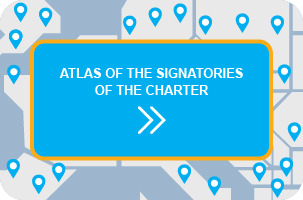General framework for equality
Article 8 – General Commitment
1. The Signatory will, in relation to all its competences, recognize, respect and promote the relevant rights and principles of equality of women and men, and combat disadvantage and discrimination related to gender.
2. The commitments set out in this Charter apply to a Signatory only where they, or relevant aspects of them, fall within its legal powers.
Article 9 – Gender Assessment
1. The Signatory undertakes, in relation to each of its areas of competence, to undertake gender assessments, as set out in this Article.
2. To this end, the Signatory undertakes to draw up a programme for implementation of its gender assessments, in accordance with its own priorities, resources and timescales, to be included or taken into account in its Equality Action Plan.
3. Gender assessments shall include, as relevant, the following steps:
- Reviewing existing policies, procedures, practices and patterns and volumes of usage, in order to assess whether they disclose any unfair discrimination, whether they are based on gender stereotypes, and whether they adequately take into account any specific needs of women and men
- Reviewing the allocation of resources, financial and other, for the above purposes
- Identifying the priorities and, as appropriate, targets in order to tackle the relevant issues arising from these reviews, and to bring about identifiable improvements in service delivery
- Undertaking, at an early stage, an assessment of all significant proposals for new or amended policies, procedures and changes in resource allocation, to identify their potential impact on women and men, and to make final decisions in the light of this assessment
- Taking account of the needs or interests of those experiencing multiple discrimination or disadvantage.
Article 10 – Multiple Discrimination or Disadvantage
1. The Signatory recognizes that discrimination on any grounds such as sex, race, ethnic or social origin, genetic features, language, religion or belief, political or other opinion, membership of a national minority, property, birth, disability, age or sexual orientation is prohibited.
2. The Signatory further recognizes that despite this prohibition, many women and men suffer from multiple discrimination or disadvantage, including socio-economic disadvantage, which has a direct impact on their ability to exercise the other rights set out and referred to in this Charter.
3. The Signatory commits itself, across the range of its competences, to take all reasonable actions to combat the effects of multiple discrimination or disadvantage including:
- ensuring that the issues of multiple discrimination or disadvantage are addressed in its Equality Action Plan and gender assessments
- ensuring that issues arising from multiple discrimination or disadvantage are taken into account when undertaking actions or measures under the other articles in this Charter
- undertaking public information campaigns to combat stereotypes and to promote equal treatment for those women and men who may suffer multiple discrimination or disadvantage
- taking specific measures to address the particular needs of migrant women and men.









